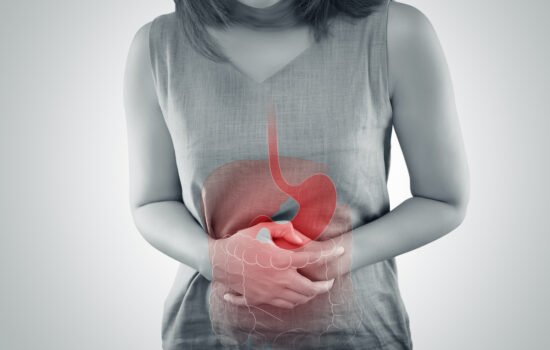February 10, 2021
What to Know About Ulcerative Colitis and Colorectal Cancer?

Ulcerative colitis (UC) is a chronic disease of the colon, also known as the large intestine. Like other chronic illnesses, UC is something people learn to live with over their lifetime. The illness causes swelling and pain in the inner lining of the intestine and rectum. Swelling damages essential cells and causes other symptoms of UC. Research shows that inflammation may cause sores that may lead to more serious medical concerns, including cancer.
One study found that people with UC are up to 5 times more likely to develop colon cancer. One in five of those diagnosed with colon cancer will die due to the link between UC and colorectal cancer. How long a person has UC, a person's age and the severity and frequency of flares all impact who will get colon cancer.
Since people with UC are more likely to develop colorectal cancer, it is important for you to try to reduce the risk of getting UC. If you are diagnosed with UC, reducing flares that may lead to a colorectal cancer diagnosis is very important. Getting regular physicals and cancer screenings plays a large role in both disease prevention and early detection that could save your life.
What is Colorectal Cancer?
Colorectal cancer is a medical term used to describe cancers that start in the colon and rectum. Depending on where the first cancer cells grow, they may be named rectal cancer or colon cancer.
Colorectal cancer is the third most common cancer for both women and men. Learn more about colon cancer signs & symptoms.
Medical Conditions That Increase Cancer Risks When You Have Ulcerative Colitis
There are many things that increase your likelihood of getting colon cancer if you have UC. For example, those who get a UC diagnosis at a young age are at greater risk. Some studies suggest that if someone in your immediate family (your mother, father, brother or sister) has UC, you are more likely to develop the illness. And, your risks of having colorectal cancer are greater.
Other medical conditions may increase your cancer risks when you live with UC, including:
- certain chronic conditions, such as diabetes, that weaken the immune system
- a diagnosis of precancerous cell damage
- having had your appendix removed
- bile duct damage, inflammation and/or scarring
Since we know there is a link between colon cancer and UC, you should be seeing someone for your UC often. Talk with them about cancer screening for colorectal cancer since you're at higher risk.
Why Does Having Ulcerative Colitis Increase the Risk of Developing Colorectal Cancer?
Having UC means living with inflammation in the large intestine. The longer you have swelling and sores in the inner lining of the colon, the higher your risk of developing cancer because sores can change from benign (non-cancerous) sores to cancerous sores as they age. Research shows that if you have UC, you are twice as likely to develop colorectal cancer than the general public. And, your risks increase with every year you have UC.
One study showed that people who have lived with UC for 30 years have an 18% likelihood of developing colon cancer while the general public only has an average of 5% likelihood. The good news is that treatment and early detection rates have reduced the cancer development rates for people with ulcerative colitis. Annual screenings are an good tool to catch signs of developing UC and reduce the risk of a colorectal cancer diagnosis in the future.
The Importance of Regular Colorectal Cancer Screening
Colon cancer often develops from a small tumor or polyp in the inner lining of the large intestine. Polyps are clumps of non-cancerous cells that may become cancerous over time. Cancer screenings save thousands of lives in the United States each year. Getting regular cancer screening tests is something you can do to protect yourself from developing colon cancer.
A simple stool sample test can detect blood in the fecal matter even before you have obvious signs of disease. This allows you and your doctor to create an advanced testing and treatment plan early, when treatment is more likely to be successful.
Colonoscopies, tests that allow your doctor to look inside the colon and rectum, make it possible to identify and remove harmless polyps before they turn into cancerous sores. Screening results also help you make lifestyle changes to reduce your rectal cancer risks. Learn more about the screening guidelines for colorectal cancer.
What Steps Can You Take to Reduce Your Cancer Risks?
Based on recent research, people with ulcerative colitis who get health screenings, manage their health, and see their doctor for a complete annual exam reduce their risks of developing or dying from colorectal cancer.
Other ways to reduce your risks of developing colon cancer include:
- eating healthy meals rich with fresh fruits and vegetables prepared at home
- having an yearly physical which includes colon cancer screening
- starting an exercise plan that promotes lean muscle growth
- losing weight, if you are overweight
- getting endoscopies or colonoscopies to identify non-cancerous sores
- consulting your doctor if your treatment plan is not controlling flares and symptoms
Seeking Treatment For Colorectal Cancer When You Have Ulcerative Colitis
If you receive a colon cancer or rectal cancer diagnosis, you will need a medical oncologist to plan your treatment. The oncologists at Cancer Care Centers of Brevard will take your UC into consideration when creating a personalized colorectal treatment plan. Depending on the stage of your cancer, your plan may include both surgical and non-surgical treatment. Our colorectal cancer specialists have the skill and experience to guide you through cancer treatment options and, when appropriate, help you consider clinical trials so you can decide which plan is best for you. We are located throughout Brevard County, including Palm Bay, Melbourne, Merrit Island, and Rockledge, FL.
Categories: Colorectal Cancer